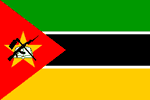

Location: Southern Africa, bordering the Mozambique Channel, between South Africa and Tanzania.
Geographic coordinates: 18 15 S, 35 00 E
Climate: tropical to subtropical
Independence: 25 June 1975 (from Portugal).
Nationality: Mozambican(s).
Capital City: Maputo.
Population: 19,104,696.
Head of State: President Joaquim Alberto CHISSANO.
Area: 801,590 sq km
Type of Government: republic.
Currency: 1 metical (Mt) = 100 centavos.
Major peoples: indigenous tribal groups 99.66% (Shangaan, Chokwe, Manyika, Sena, Makua, and others), Europeans 0.06%, Euro-Africans 0.2%, Indians 0.08%.
Religion: indigenous beliefs 50%, Christian 30%, Muslim 20%.
Official Language: Portuguese.
Principal Languages: Portuguese, indigenous dialects.
Major Exports: prawns 40%, cashews, cotton, sugar, copra, citrus, coconuts, timber (1997).
History: The area was first inhabited by hunter-gatherers. Nearly 2,000 years ago Bantu-speaking people swept into the region and settled there. The Portuguese explorers who reached what is now Mozambique in 1498 were preceded by Arab traders.
Around 1500, Portugal established coastal
forts and conducted a thriving trade in gold, slaves, and ivory. Fixed
colonial boundaries were drawn around Mozambique in the late 1800s, but
little was done to develop the colony except what was necessary to
facilitate exploitation. In fact, Portugal made no pretense of social
development. By 1975 only 10% of the population was literate, and even
rudimentary bureaucratic and technical skills were rare.
In 1962 the Front for the Liberation of
Mozambique (FRELIMO) was created, and by 1964 an armed campaign against
Portuguese colonial rule was launched. In 1974, after a momentous coup in
Lisbon ended half a century of dictatorship there, Portugal agreed to leave
Mozambique. After a short period of joint rule, Mozambique became fully
independent in 1975. FRELIMO leader Samora MACHEL became president, with
FRELIMO the sole legal party. The constitution established an indirectly
elected legislature as the supreme state institution. In reality, most key
decisions were made by the political bureau of FRELIMO, and FRELIMO elected
the president.
Independence presented the new government with a daunting array of social and economic problems and few institutions equipped to address them. As the government later conceded, it committed some disastrous blunders, especially in economic policy, but it made impressive headway in health care and education. It also provided crucial support to rebel opponents of the white supremacist regime in Rhodesia (now Zimbabwe).
In response, Rhodesia created the Mozambique National Resistance (RENAMO) to attack rebel bases in Mozambique. When Zimbabwe gained black majority rule in 1980, South Africa adopted RENAMO, which embarked on a campaign of violence calculated to destabilize Mozambique and end its support for opponents of South Africa's regime.
In
1984, faced with a ruined economy and unable to suppress RENAMO, Mozambique
signed a non aggression pact with South Africa. Mozambique kept the
agreement, but South Africa continued to aid RENAMO for several more years.
President Machel died in a 1986 plane crash and was replaced without incident by Joaquim A. Chissano. In 1990 the name of the country was changed from the People's Republic of Mozambique to Republic of Mozambique, and a new constitution was adopted. It abandoned Marxist-Leninism and provided for a multiparty system of government headed by a president directly elected by universal suffrage to a maximum of two 5-year terms. Members of the legislature, renamed the Assembly of the Republic, were also to be directly elected to 5-year terms.
Also in 1990, the government and RENAMO signed a limited cease-fire accord along the Beira corridor and the railroad from Zimbabwe to Maputo. In March 1992 the two sides signed a protocol on a future system of proportional representation, with elections to take place one year after the signing of a nationwide cease-fire.
In August, Chissano and RENAMO leader Afonso Dhlakama met face-to-face for the first time and signed an accord, effective on Oct. 1, 1992, calling for a cease-fire and democratic elections. Even if the war were brought to an end, however, the nation's problems remained formidable. International criticism was heard early in 1993 regarding the slow pace of the implementation of the terms of the peace treaty.
